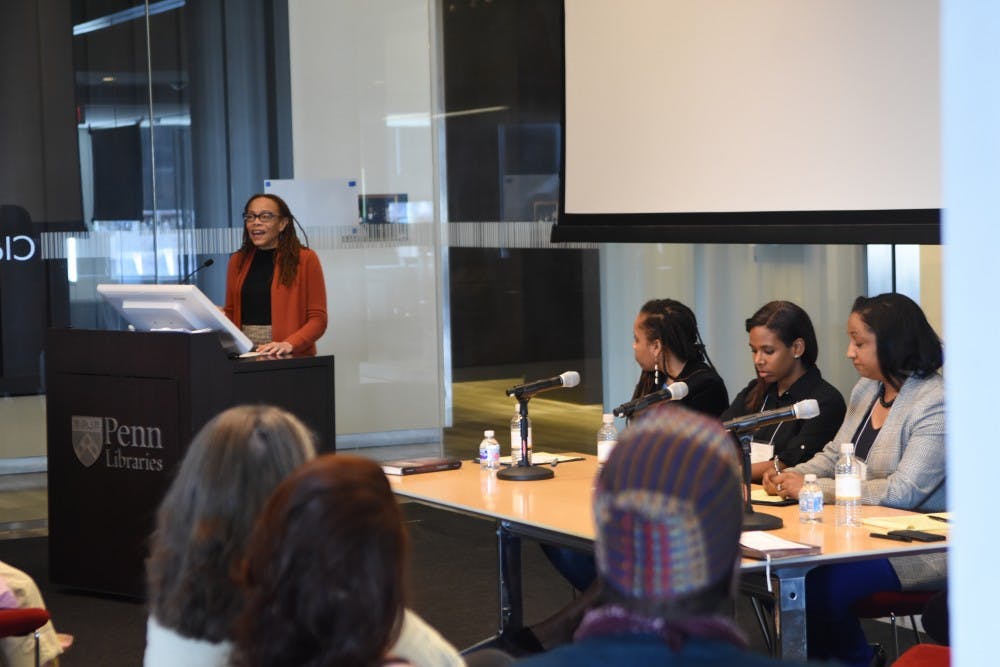
Penn Professor Dorothy Roberts led the Penn and Slavery Symposium.
Credit: Katharine CocherlThe University of Pennsylvania’s legacy is interlocked with the commodification and brutalization of enslaved people. Far from the glossy imprint of grandeur and the lore of exceptionalism lives the University's complex history of complicity in the institution of slavery, despite previous claims by University officials that Penn was not directly involved in the slave trade.
Previously, a Penn spokesperson has said that, though the University had explored potential connections to slavery "several times over the past few decades," it had never found any "direct University involvement with slavery or the slave trade." Ultimately, the University corrected the record after the student-led Penn and Slavery Project produced clear evidence of Penn’s complicity. The Penn and Slavery Project upended a denial that had been gripped tightly by school administrators for over a decade. When Brown University and other universities began to wrestle with their historical participation in slavery, Penn unequivocally stated there was “no connection” between the University and this grotesque institution. The project began in 2017 when a group of undergraduate students embarked on an independent study to see if there was a connection.
The student researchers found that many of Penn’s trustees, founders, and faculty were enslavers. This isn’t surprising for a University that has roots in the founding of a nation where wealth was built through an economy based on racialized capitalism, whereby the labor of black people was stolen and extracted for profit.
This includes their bodily remains, made into medical currency through cadaver trading and the proliferation of false science known as polygenism. From chattel slavery through emancipation and thereafter, institutions continued to benefit from slavery by peddling in science based on false ideas of racial difference. There was academic currency in developing the white supremacist notion of racial medicine. This meant that black people dead or alive were traded as a commodity. In her groundbreaking book The Price For Their Pound of Flesh, historian Daina Ramey Berry writes that even after death, the bodies of enslaved people had value, and that this “ghost value enabled the bodies of the enslaved to generate money for enslavers after death.”
One of the most notable purveyors of damaging ideas of racial hierarchy was Penn professor and alumnus Samuel Morton. Morton, who was a physician, collected the crania of black people who are believed to have been enslaved in their lifetime. According to compiled research of the Penn and Slavery Project, there are 77 crania contained in the catalogs of Morton’s collection within the Penn Museum, the majority coming from a single purchase from Cuba. Morton purchased these crania taken from deceased enslaved people on the Vedado Plantation.
In Crania Americana, Morton posits a theory of racial hierarchy, explaining that racial difference is innate, and that this could be confirmed by exploring and documenting the difference in cranial size by race. According to Morton, black people “have little invention, but strong powers of imitation, so that they readily acquire mechanic arts.” The legacy of Morton's and other race scientists' work can be found in the racial inequities in health care that negatively impact the well-being of black people. It is no coincidence that the trauma of experimentation, pathologies, and disease of black people are embedded in the history of the medicalization of blackness.
Penn is doubly complicit in its harm to black communities. It has a history of enslavers as benefactors and it currently pushes out local black communities — physically, through university expansion, and culturally, through its hesitation to invest more fully in projects such as the PSP. Yes, Penn has convened a working group and has corrected its position on its history of complicity in the institution of slavery, but this is not enough. In my piece addressing this very issue in the Inquirer, I state the need for discussion about reparative action. I launched an online petition to demand the University returns the remains of enslaved people to their descendants or inter them immediately.
There is a larger conversation happening in the United States about reparations: payment to the descendants of enslaved people for the labor that was stolen from their ancestors. This isn’t a radical idea, but a necessary demand: for nations and institutions that made their fortunes and secured their futures on the backs of the enslaved to be held accountable.
Penn as an educational institution is designated as a nonprofit and avoids payment of property taxes. Many educational advocates within the city and progressive groups have pushed for the University to make payments to the city’s general fund, called PILOTs or Payments In Lieu of Taxes. This would mean that a portion of Penn’s budget would voluntarily be paid to the city, which would allow for more funding for a desperately under-resourced school system. This could be one step in an ongoing practice of reconciliation that could support black and brown students within Philadelphia.
As a resident of West Philadelphia, I bear witness daily to the power and hubris of a university that shows little care regarding its impact on the community surrounding its structures. The displacement caused by gentrification largely driven by Penn’s augmentation of campus space and student housing doesn’t bode well for impoverished black communities. These communities are subject to the whim of development that is neither community-rooted nor inclusive to the voices of generations of black people trying to survive within a capitalist system. Penn has work to do and resources to return to our communities.
ABDUL-ALIY MUHAMMAD is a lifelong resident of West Philadelphia. They are a cofounder of the Black and Brown Workers Cooperative, a social justice organization.
The Daily Pennsylvanian is an independent, student-run newspaper. Please consider making a donation to support the coverage that shapes the University. Your generosity ensures a future of strong journalism at Penn.
Donate






